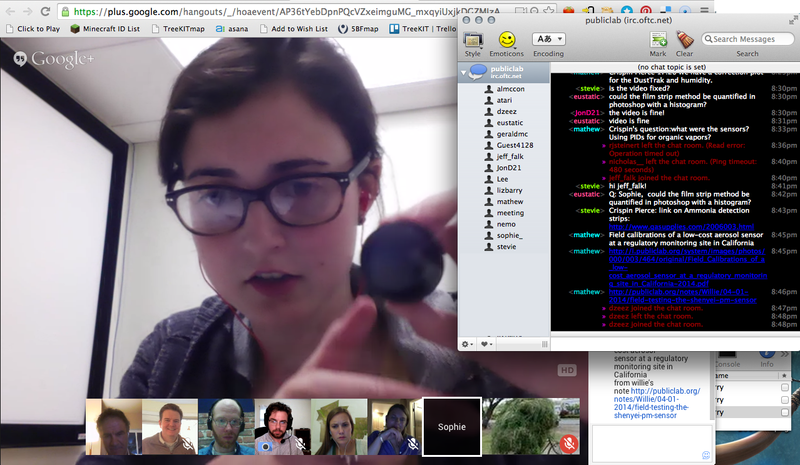
OpenHour
OpenHour is an interactive seminar hosted by the Public Lab community, both online and in person. The topics of OpenHour vary from presentations on tools and methods, discussions on environmental issues, to approaches to data-based advocacy. OpenHour is a great way to meet people in the Public Lab community. Bring your research, your ideas, and your questions, and join us for OpenHour!
- OpenHour is held typically on the first Monday of the month. We occasionally shift this schedule to accomodate guest speakers!
- The time generally alternates between 8 p.m. ET in odd months and 1 p.m. ET in even months.
- See schedule below for times and topics.
- The event is hosted on Zoom -- see weblink and call-in numbers in the event info below!
- Subscribe to https://www.youtube.com/c/PublicLab to get a notification whenever an OpenHour recording is posted!
July 2020 update
OpenHour programming is temporarily on pause. Thank you for your patience. Check back soon for updates.
Past OpenHours
Click here for the OpenHour archive and watch any of the OpenHours listed below
2021 OpenHours
- June: Rescheduled
- May: Rescheduled
- April 19: Law and Environmental Monitoring
- March 8: (Soil!) Stories from the Underground
- Feb 8: Undermined: Voices from the Frontlines of Frac Sand Mining
- Jan 11: Solar Balloons
2020 OpenHours
- December 9: Take Back Your Air - Using the Bucket Air Quality Monitor
- November: Rescheduled
- October 5: Lessons from the Land Loss Lookout Project
- September 14: Celebrating Summer of Code 2020
- August 3: Understanding Existing Environmental Data
- July 6: Public Lab Hora Abierta
- June 8: Environmental Storytelling
- May 2: Live Build Mini Kites in coordination with NASA
- April 4: Law and Environmental Monitoring
- March 2: Particulate Matter Monitoring
- February 3: Community Science Education
2019 OpenHours
- December 9: Reflecting on OpenHour
- November 12: Monitoring for Oil in Water
- October: MAKE month! Our collaboration with Make Magazine hit newsstands in October! See more about our project on our MAKE Wiki and get your copy here.
- October 3: Build a Community Microscope
- October 5: BabyLegs Trawl Learn how to make a DIY trawl
- October 9: The Coqui and a DIY particulate sensor
- October 28: Discussing all of our kits!
- September 3: Summer of Code presentations
- August 5: Odors
- July 15: BabyLegs (monitoring ocean plastics)
- June 3: Environmental Education
- May 6: Launching Summer of Code
- April 1: Soil Testing
- March 4: Diffusion tubes test air quality in the UK
- February 4: Community Science Disaster Response Toolkit
- January 7: Lead
2018 OpenHours
- December 3: Usability Feedback for PublicLab.org
- November 5: Technology and process in working with Environmental Justice and environmental health impacted communities
- October 1: Google Code-In
- September 10: Using the new Community Microscope
- August 6: Summer of Code Projects
- July 9: Code of Conduct 3 year review
- June: (summer break, no OpenHour)
- May 7: Events
- April 1: Marine Plastics
- February 5: Developing Community Kits with Public Lab
- January 8: Exploratory hydrogen sulfide monitoring methods
2017 OpenHours
- December 4th: Data Loggers for Environmental Monitoring
- November 13th: Barnraising sessions continued
- October 2nd: Collaborations in disaster response between online and on the ground groups
- September 11th: Summer of Code 2017
- August 7th: Problem Identification
- July 10th: Aerial Mapping
- June 5th: Facilitation Techniques and Resources
- May 1st: Art in Environmental Science Advocacy
- April 3rd: Fundraising for Projects
- March 6th: Water Water Everywhere! A discussion of monitoring strategies and tools
- February 6th: New Year, New Challenges: the shifting landscape of advocacy
- January 9th: Classifying Waste
2016 OpenHours
- December 5th: Environmental monitoring methods recognized by enforcement bodies
- November 7th: New contributors to open source code
- October 3rd: Such Activities, Very Replication!
- September 6th: Google Summer of Code Projects
- August 1st: Public Comment on Environmental Issues
- July 7th: Learning about the Barnraising in Val Verde!
- June 6th: Exploring Proof
- May 2nd: Public Lab's research culture
- April 4th: Open Access to Environmental Data
- March 7th: Soil and Soil Testing
- February 1st: Landfills: Mapping and Monitoring!
- January 28th: Live Call on QGIS
2015 OpenHours
- December 7th: The Oil Testing Kit!
- November 2nd: Gearing up for the Barnraising
- October 20th, Live Call: Calibration and Characterization of DIY Instrumentation
- October 5th: Formaldehyde and the Plant Remediation Experiment
- September 9th: "Transparency in Environmental Policy and Science."
- August 3rd, Mapping in the Middle of it!
- July 6th: Open Air Projects
- June 1st: Public Lab Web Development behind the code
- May 4th: Public Lab's 5 year anniversary party!
- Monday, April 6th: Learning
- March 2nd: Engaging in "C" Science
- February 2nd: Lending Libraries
- January: Energy!
2014 OpenHours
- December 1st:Public Lab: A year in review and what's coming next.
- November 18th: the Water Hackathon in New Orleans
- November 3rd: Gearing up for the Barnraising!
- October 6th: Events and Event Hosting
- September 1st: Open Topic Session
- August 4th: Thermal Imaging
- July 28th: Open Air: air pollutants and air quality monitoring tools
- July 21st: Water Contaminants and Detection
- July 14, 2014: Spectral Analysis
- July 7, 2014: Near Infrared Photography
- June 30th, 2014: Aerial Mapping
Want to connect outside OpenHour? Join an Open Call
Open Calls are a great way to connect with fellow Public Labbers on projects and ideas. They are designed to help you connect with fellow Public Labbers to brainstorm, share ideas and move forward on projects. These calls hosted every Tuesday at 3pm ET (2 central) and are Public Lab community. More information can be found here.